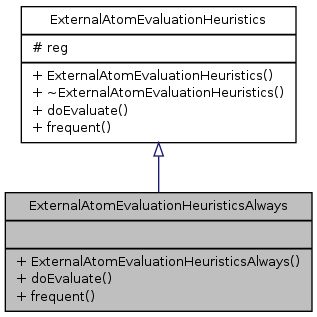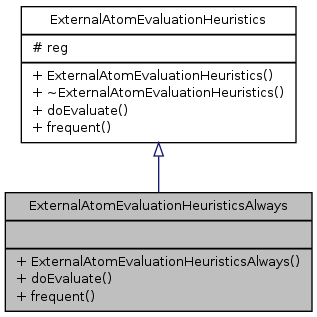Evaluates always when the heuristics is asked. More...
#include <include/dlvhex2/ExternalAtomEvaluationHeuristics.h>


Public Member Functions | |
| ExternalAtomEvaluationHeuristicsAlways (RegistryPtr reg) | |
| virtual bool | doEvaluate (const ExternalAtom &eatom, InterpretationConstPtr eatomMask, InterpretationConstPtr programMask, InterpretationConstPtr partialAssignment, InterpretationConstPtr assigned, InterpretationConstPtr changed) |
| Decides if the reasoner shall evaluate a given external atom at this point. | |
| virtual bool | frequent () |
| Decides if the heuristics is called more or less frequently. | |
Detailed Description
Evaluates always when the heuristics is asked.
Definition at line 54 of file ExternalAtomEvaluationHeuristics.h.
Constructor & Destructor Documentation
| DLVHEX_NAMESPACE_BEGIN ExternalAtomEvaluationHeuristicsAlways::ExternalAtomEvaluationHeuristicsAlways | ( | RegistryPtr | reg | ) |
Definition at line 44 of file ExternalAtomEvaluationHeuristics.cpp.
Member Function Documentation
| bool ExternalAtomEvaluationHeuristicsAlways::doEvaluate | ( | const ExternalAtom & | eatom, |
| InterpretationConstPtr | eatomMask, | ||
| InterpretationConstPtr | programMask, | ||
| InterpretationConstPtr | partialAssignment, | ||
| InterpretationConstPtr | assigned, | ||
| InterpretationConstPtr | changed | ||
| ) | [virtual] |
Decides if the reasoner shall evaluate a given external atom at this point.
- Parameters:
-
eatom The external atom in question. eatomMask Mask with all atoms relevant for this external atom. programMask All atoms in the program. partialAssignment The current (partial) interpretation. assigned The current set of assigned atoms; if 0, then the interpretation is complete. changed The set of atoms with a (possibly) modified truth value since the last call; if NULL then all atoms have (possibly) changed.
- Returns:
- True if the heuristics suggests to evaluate the external atom, otherwise false.
Implements ExternalAtomEvaluationHeuristics.
Definition at line 49 of file ExternalAtomEvaluationHeuristics.cpp.
| bool ExternalAtomEvaluationHeuristicsAlways::frequent | ( | ) | [virtual] |
Decides if the heuristics is called more or less frequently.
External atom evaluation heuristics are called only when at least one relevant atom has changed since the last call. To this end, external atoms hold watches on the atoms. The number of such watches is controlled by this method. If it returns false (default), then each external atom randomly adds a watch exactly to one of the relevant atoms. If it returns true, then each external atom watches all relevant atoms. In the former case, the heuristics is only called if a particular relevant atom changes, while in the latter case it is called whenever any relevant atom changes. This might allow for earlier propagation (by nogood learning), but causes more overhead.
As a rule of thumb, heuristics which mostly decide to evaluate external atoms might want to further increase the evaluation frequency by returning true, while heuristics which mostly decide not to evaluate external atoms usually return false to avoid overhead.
- Returns:
- True if the heuristics wants to be called more frequently, otherwise false.
Reimplemented from ExternalAtomEvaluationHeuristics.
Definition at line 55 of file ExternalAtomEvaluationHeuristics.cpp.
The documentation for this class was generated from the following files:
- include/dlvhex2/ExternalAtomEvaluationHeuristics.h
- src/ExternalAtomEvaluationHeuristics.cpp
